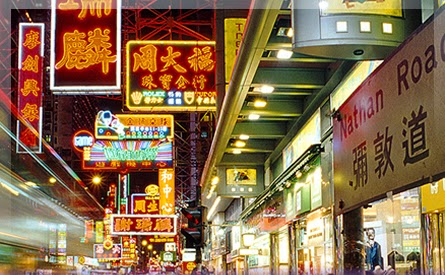I arrived at Chungking Mansions on a cold, rainy April day, and anyone who's lived or traveled for an extensive period in Asia knows the drill. At every corner stands a skinny Bengali tout in a loud shirt, trying to grab your attention, get you to come to a guesthouse, tailor, moneychanger, or fly-by-night travel agency. The wider the smile, the greater the deception.
-Hey mister, you looking for something?
I do my best to avoid eye contact, and get into my cramped room as quickly as I can. I drop my bags and try to explore the city. With a limited budget and knowing no one, I walked and walked, until my calves ached, until I just wanted to sit down and watch the boats cross the harbor.
On the one side, it is a city of stone steps tumbling down steep hillsides, narrow and vertiginous streets cutting between tiny restaurants and Chinese herbalist shops where calico cats bask in sunbeams atop pallets of dried cuttlefish and chrysanthemum petals, of mid-century apartment blocks in white brick and sea-green tile with old British colonial street signs in an elegant modernist font, of storybook trams and ferries and schoolchildren with bright red umbrellas, of the warm smells of Taoist temple incense in chilly weather and goose fat pressed into fresh-cooked rice-- a Wes Anderson movie waiting to be made.
On the other, Hong Kong is a banking capital as bland as any other the world over. Its CBD is a tangle of escalators connecting countless antiseptic, high-security structures, with the same piano music, the same black-and-white photos, men with Breitling watches on well-muscled arms and women with Hermès bags dangling from their avian shoulders. I walked through the nightlife sections, and can't find a bar that didn't pulse with vaguely "European" dance music, that wasn't filled with aspiring financial criminals and the braying voices of posh London and Lower Manhattan.
These two Hong Kongs exist parallel to each other, sometimes on the street, often kissing, their eyes closed to each other.
Yet they are bound together by their sheer density, the density of a narrow city wedged between the mountains and the sea. I walked up Nathan Road at night, past rows of old textile factories and towers filled with shoebox apartments, amid an infinite entanglement of glowing Chinese characters.
And on a fine sunny afternoon I took the subway to the north, to where the world's densest human habitation once rose up, a towering slum that is now a park filled with odd chunks of concrete and low-lying tumuli.
I ended my trip atop Victoria Peak, the lush, misty mountain that looms over Central Hong Kong, to see the whole thing at once.
Staring outwards, surrounded by cheery groups of tourists-- Singaporean families, Thai honeymooners, Malaysian retirees. Alone, in my shabby clothes and worn-out sneakers, stubble-faced, without a camera and politely refusing the audio tour, it was impossible not to feel out of place and vaguely suspect.
But what is travel if not dislocation. And this is something people don't talk about very often. And something that becomes all the more salient when you're in a place like Hong Kong, a city with a government predicated on a contradiction, a city that is either self-loathingly Asian or pretentiously Western, either a bastion of democracy in a totalitarian state or the same state's poodle. It is in a place like this, in a situation like this, that the entire world seems to be centered within the field of view of a telescope.
Monday, April 28, 2014
Subscribe to:
Post Comments (Atom)




No comments:
Post a Comment